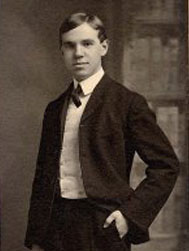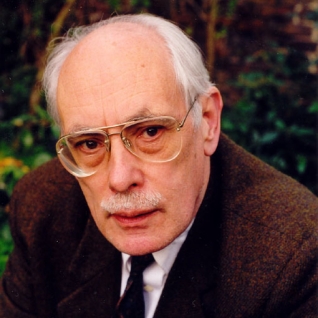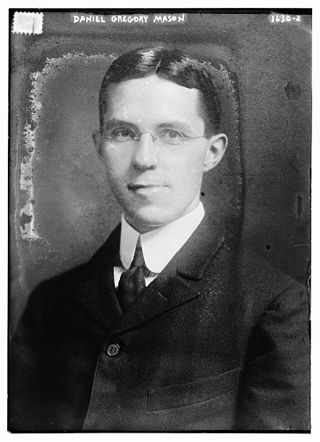Career
Teaching
Mekeel taught at the New England Conservatory (1964–70) and Boston University (from 1970). [3] In 1983, she was a research affiliate at the MIT Center for Advanced Visual Studies. [5] At Boston University, she directed the electronic music studio and taught private composition lessons, as well as classes in Advanced Counterpoint, Cannon and Fugue, (for graduate students), Pedagogy of Theory, Ear Training and Music Theory. Articles include (1959) "The Harmonic Theories of Kirnberger and Marpurg", Journal of Music Theory Volumes. 3-4, Yale, p. 169-193. Several of her pupils went on to become professors of music themselves. It has been noted that Mekeel was especially tough on her female students, holding them to a higher standard in their work. Ultimately this would be necessary for them to get recognized within the music world. [6]
Compositions
Many of her works are for theater or dance, and many of her works treat the voice or traditional instruments unusually. [7] "Mekeel’s compositions include solo instrumental works, chamber music, orchestral and vocal music, and dramatic pieces for dancers, actors, and actresses with instrumentalists. Her compositions were especially championed by Richard Pittman and the Boston Musica Viva. [2] Mekeel wrote music for Fenwick Smith and the Empire Brass Quintet. [4]
"Mekeel's approach to music is eclectic and reflects her diverse interests. Often drama is used as a catalyst. For example, Corridors of Dreams (1972), Serena (1975), and Alarums and Excursions (1978) use multilingual texts. Some of her compositions employ as many as eight languages, and the execution of the text is an integral part of the composition. In Mekeel's instrumental works, her combination of instruments and voice is unique, and the sound of words is an important part of her timbral resources. She avoids reliance on institutional musical organizations like the orchestra, preferring to choose instruments and groupings of musicians which allow her to innovate." [8]
Mekeel's compositions were known for their elegant style. They were finely tuned, with clear contrapuntal textures. The works are not overtly emotional, but beautiful thought provoking and captivating.
Toward The Source
Joyce Mekeel’s “Toward the Source” for orchestra and chorus was commissioned by the Concord Bicentennial Committee and was premiered by the Concord Orchestra and the Concord-Carlisle High School Concert Choir for the April Patriots’ Day celebration in 1975. Joyce Mekeel did extensive research to complete her assignment to interpret “Concord, its rivers, and its search for values.“The piece relates the town’s history from 1635 to the time of the transcendentalists. The chorus recites Indian place names, sites on the river, Biblical quotes, tombstone inscriptions and the name of every colonial fighter at the North Bridge the day of “the shot heard ’round the world.” It concludes with a quote from the hymn that Ives used as the basis of the “Concord Sonata,” a work inspired by the transcendentalists. [9]
Serena
Joyce Mekeel's "Serena" was commissioned by the Berkshire Music Center and the Fromm Music Foundation of Harvard and was premiered by performers - Beverly Morgan (mezzo‐soprano), Linda Livingood (speaker), and William Goldenberg (pianist), at the Tanglewood Music Festival in 1975. "She chose a difficult mixture of idioms, but was in full command of the problem." While the mezzo-soprano sings a multi-lingual text put together from various writings of Ungaretti, Petronius Arbiter, Basho, the composer herself among many others; the speaker pronounces a prose poem by Thomas Mann about the coming of night, sweet death and peace. "A piano cunningly fitted out Cage style", with cymbals and other tone‐altering impedimenta on the strings, accompanies this dialogue with a simple yet exotic sound and "an occasional outburst of clattering hysteria." [10]
Discography
Source: [3]
Stage
- Androcles and the Lion (G.B. Shaw), 1961
- Jaywalk, va, dancer, 1969
- Moveable Feast nos.1–3, vv, insts, 1973–4, collab. P. Earls and L. Davidson
Instrumental
- Gifts of the Ebb Tide, pf, 1965
- Str Figures Disentangled by a Flute, fl, str orch, 1968
- Shapes of Silence, fl, 1969
- Spindrift, str qt, 1970
- Embouchure II, 3 tpt, 3 trbn, 1972
- Hommages, 2 tpt, hn, trbn, tuba, 1973
- Planh, vn, 1974
- Rune, fl, perc, 1976
- Vigil, orch, 1977, rev. 1986
- Scroll of Hungry Dreams, tuba, 1980
- Fertile Vicissitudes, ob, hp, 1981
- essera, hpd, ens, 1981
- Insomnia of Owls, ww qnt, 1984, rev. 1985
- Voices, vn, cl, pf, 1985
- Obscurities of Order, eng hn, orch, c1990
- Pantoum, vn, pf, c1991
Vocal
- Phrases (G. Stein), S, pf, 1960
- Dark Rime (R.M. Rilke), S, pf, 1965
- White Silence (Jap. haiku, trans. Mekeel), SATB, 1965
- Waterwalk (Mekeel), speaking SATB, 1970
- Corridors of Dream (W. Kandinsky, M.P. Hein, W.D. Schurre, A. Stramm, H.M. Enzensberger), Mez, a fl, cl, va, vc, hp, perc, 1972
- Serena (P. Arbiter, G. Ungaretti, Bashō, T. Mann), spkr, Mez, prep pf, 1975
- Toward the Source (Pss, prayers, hymns), SATB, orch, 1975
- Alarums and Excursions (Sanskrit, Stramm, e.e. cummings, Ungaretti, E. Dickinson, Aeschylus, G. Seferis, Jap. haiku), Mez + actor, fl, cl, vn, va, vc, perc, 1978
- Journeys of Remembrance (M. Twain, C. Jung, J.L. Borges, S. Freud, J. Gardner, others), S, Mez + actor, Bar, fl, cl, eng hn, vn, va, vc, perc, c1986
Electro-acoustic
Embouchure I, tape, 1969, collab. L. Davidson; Kisses and Kazoos (Valentine’s Day cards, etc.), 3 spkrs, live tape, 1977, collab. Davidson and P. Earls; Sigil (Stein, D. Boehm, Ungaretti, T. Roethke, A. Camus, Mann, Borges), 2 actors, 2 eng hn, cl, dbn, 2 hn, tuba, str qt, elecs, 1980–81, rev. 1997
Yūji Takahashi is a composer, pianist, critic, conductor, and author.

Julia Wolfe is an American composer and professor of music at New York University. According to The Wall Street Journal, Wolfe's music has "long inhabited a terrain of its own, a place where classical forms are recharged by the repetitive patterns of minimalism and the driving energy of rock". Her work Anthracite Fields, an oratorio for chorus and instruments, was awarded the 2015 Pulitzer Prize for Music. She has also received the Herb Alpert Award (2015) and was named a MacArthur Fellow (2016).

Charles Tomlinson Griffes was an American composer for piano, chamber ensembles and voice. His initial works are influenced by German Romanticism, but after he relinquished the German style, his later works make him the most famous American representative of musical Impressionism, along with Charles Martin Loeffler. He was fascinated by the exotic, mysterious sound of the French Impressionists, and was compositionally much influenced by them while he was in Europe. He also studied the work of contemporary Russian composers such as Scriabin, whose influence is also apparent in his use of synthetic scales.
Willy Burkhard was a Swiss composer and academic teacher, influential in both capacities. He taught music theory at the Berne Conservatory and the Zürich Conservatory. His works include an opera, oratorios, cantatas, and many instrumental genres from piano pieces to symphonies.
Miriam Gideon was an American composer.
Anđelka Bego-Šimunić was a Bosnian-Herzegovinian composer of Croatian descent. She taught at the Sarajevo Music Academy in Sarajevo, Bosnia and Herzegovina.

Alwynne Pritchard is a British composer, performer, artist, and curator based in Bergen, Norway. Known for her interdisciplinary approach, Pritchard works with sound, voice, and body, blending music, theatre, and visual elements. She is the co-founder of the music-theatre company Neither Nor and served as Artistic Director of the BIT20 Ensemble in Bergen from 2016 to 2018.
Mary Jeanne van Appledorn was an American composer of contemporary classical music and pianist.

Justin Riveagh Connolly was a British composer and teacher.
David del Puerto is a Spanish composer.

Daniel Gregory Mason was an American composer and music critic.
Michael Hennagin was an American composer and university professor.
Peter Dickinson was an English composer, musicologist, author, and pianist.
Liviu Marinescu is a Romanian composer of orchestral and chamber music. He teaches at California State University, Northridge.

David Froom was an American composer and college professor. Froom taught at the University of Utah, the Peabody Institute, and the University of Maryland, College Park, and he was on the faculty at St. Mary's College of Maryland from 1989 until his death in 2022. He has received awards and honors from the Guggenheim Foundation, the American Academy of Arts and Letters,, the Fromm Foundation at Harvard, the Koussevitzky Foundation of the Library of Congress, the Barlow Foundation, and was a five-time recipient of an Individual Artist Award from the State of Maryland.
Giorgos Koumendakis is a Greek composer. He was appointed musical director and creator of musical scenario for the Opening and Closing ceremonies of the 2004 Summer Olympics in Athens.

Andrew Waggoner is an American composer and violinist.
This page is based on this
Wikipedia article Text is available under the
CC BY-SA 4.0 license; additional terms may apply.
Images, videos and audio are available under their respective licenses.






